You delivered the strong into the hands of the weak... The words of the Chanukah Al Hanissim prayer danced in my head side by side with the images of Mumbai. Chanukah was here: a time for celebrating miracles. What is our way to bring about a contemporary miracle in our times? Is it our mission to become a Jewish version of warriors and rise up like a band of raggedy armed Maccabees against the scourge of evil?
After the tragedy in Mumbai, our Chabad center in Nashville, Tennessee, joined so many others in choosing to host a community memorial. Yet one inconsolable woman kept emailing me. "Is that our response? Shouldn't we mobilize to protect our people and the innocents around the world?"
I wrote back, "The forces of light can cause the forces of evil to recede."
You delivered the many into the hands of the few...
I tried to direct her to a larger city, with more resources. After all, who were we in our city of Nashville to start a global defense?
My friend was persistent. "All it takes is one person, one individual, to speak out, for an idea to catch fire."
That was part of Chabad philosophy. However, our teachings also say that our particular mission is not to fight; but to spread light, dispelling darkness. The goodness and kindness that we practice and teach to others have the power to overturn the world.
Still, in my mind, the images seen from Mumbai burned. No matter how furiously I worked, how many classes I gave, I would think of the callous disregard for life shown in India, and feel empty inside.
Then came Chanukah. They had been sitting peacefully in the Oberoi Hotel cafe when the gunmen burst in. An explosion of light could be seen from one end of the globe to the other. From the beaches in Australia, to the great European capitals, and to our own Washington, D.C., the Menorahs stood towering over the masses, shining their light of freedom. Their light burns pure and strong, untouched and unfazed by evil.
On the day of our Menorah lighting at the capitol in Tennessee, I woke up early. The question was now immediate. Does light truly banish darkness? I recalled vaguely that there had been some Nashvillians visiting in Mumbai at the Oberoi restaurant, caught in the crossfire of terror. I tried to call one of them to invite her to our Menorah lighting.
"Thank you so much," said her husband. "But you know, after everything we've been through, my wife needs quiet. We need to heal."
I hung up the phone, and with the help of G‑d, I reached the only other survivor from Nashville, Rudrani Devi. Her husband, a country music producer, answered my call. When I spoke about Chanukah, he seemed familiar with the holiday. When I spoke to him about our public Menorah lighting, he knew of our beautiful stylistic steel Menorah on Capitol Hill. I explained how we believed in spreading light. Would his wife, who had faced such a dark moment in her life, hold the torch on this night to illuminate the dark? He loved the idea, but had to speak to his beloved.
The phone rang two minutes later. I was unsure of what to expect. Rudrani, I knew, was a yoga instructor who had joined a group of Americans traveling to India. They had been sitting peacefully in the Oberoi Hotel cafe when the gunmen burst in, spreading terror. Darting under the table, she found herself holding a man and his daughter. She tried to comfort them, but the terrorists soon returned, firing wildly, and she felt their bodies go limp. Alan and Naomi Sherr, her good friends, had returned their souls to their maker.
She felt herself being dragged to the kitchen. She found out later that a bullet had lodged in her thigh. But G‑d had a miracle planned for her. When the terrorist threw one last grenade, it landed two feet from her head and did not explode.
She was recovering from several operations, and she still could not walk; yet her voice had a cadence of vitality to it.
"My spiritual name means healer of pain. I believe there is one G‑d above us all. I would be so honored to light your Menorah."
Under a cold starry night, Rudrani Devi sat beside our Menorah in her wheelchair. Her spirit was too strong for evil to extinguish. "My spiritual name means healer of pain. When my husband, Rabbi Yitzchok Tiechtel, spoke about facing dark times, her eyes glistened with tears. With soft curls framing her face, and a blanket draped over her lap, she bravely held the torch and listened as he recited the blessings. When she lit that flame, it seemed as if 175 souls had found solace. After the ceremony, she had a radiant smile. As they lifted her wheelchair to carry her down, the media converged near her.
"Why had she come to the Menorah lighting? Was she from the Jewish community?"
She shook her head and her voice was gentle, yet strong. "I too believe in the power of light."
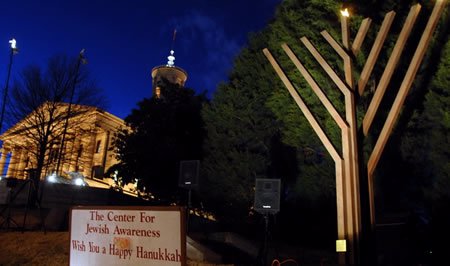
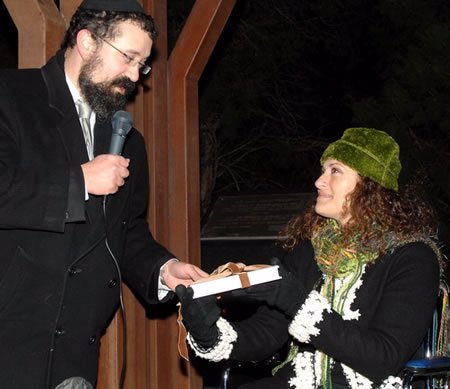

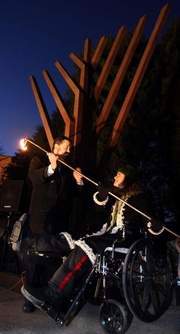

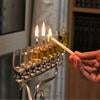
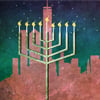


Join the Discussion